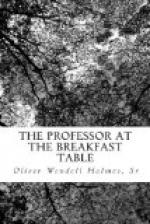Salem! Salem! not Boston,—shouted the little man.
But the Koh-i-noor laughed a great rasping laugh, and the boy Benjamin Franklin looked sharp at his mother, as if he remembered the bun-experiment as a part of his past personal history.
The Little Gentleman was holding a fork in his left hand. He stabbed a boulder of home-made bread with it, mechanically, and looked at it as if it ought to shriek. It did not,—but he sat as if watching it.
—Language is a solemn thing,—I said.—It grows out of life,—out of its agonies and ecstasies, its wants and its weariness. Every language is a temple, in which the soul of those who speak it is enshrined. Because time softens its outlines and rounds the sharp angles of its cornices, shall a fellow take a pickaxe to help time? Let me tell you what comes of meddling with things that can take care of themselves.—A friend of mine had a watch given him, when he was a boy,—a “bull’s eye,” with a loose silver case that came off like an oyster-shell from its contents; you know them,—the cases that you hang on your thumb, while the core, or the real watch, lies in your hand as naked as a peeled apple. Well, he began with taking off the case, and so on from one liberty to another, until he got it fairly open, and there were the works, as good as if they were alive,—crown-wheel, balance-wheel, and all the rest. All right except one thing,—there was a confounded little hair had got tangled round the balance-wheel. So my young Solomon got a pair of tweezers, and caught hold of the hair very nicely, and pulled it right out, without touching any of the wheels,—when,—buzzzZZZ! and the watch had done up twenty-four hours in double magnetic-telegraph time!—The English language was wound up to run some thousands of years, I trust; but if everybody is to be pulling at everything he thinks is a hair, our grandchildren will have to make the discovery that it is a hair-spring, and the old Anglo-Norman soul’s-timekeeper will run down, as so many other dialects have done before it. I can’t stand this meddling any better than you, Sir. But we have a great deal to be proud of in the lifelong labors of that old lexicographer, and we must n’t be ungrateful. Besides, don’t let us deceive ourselves,—the war of the dictionaries is only a disguised rivalry of cities, colleges, and especially of publishers. After all, it is likely that the language will shape itself by larger forces than phonography and dictionary-making. You may spade up the ocean as much as you like, and harrow it afterwards, if you can,—but the moon will still lead the tides, and the winds will form their surface.
—Do you know Richardson’s Dictionary?—I said to my neighbor the divinity-student.
Haow?—said the divinity-student.—He colored, as he noticed on my face a twitch in one of the muscles which tuck up the corner of the mouth, (zygomaticus major,) and which I could not hold back from making a little movement on its own account.




